
If you want to understand why so many Americans distrust the Food and Drug Administration and the medical mainstream, look no further than the FDA’s new online medical education program on dietary supplements.
Produced in collaboration with the American Medical Association, this three-part continuing medical education (CME) course—and I use that term loosely—is part of a new FDA initiative to educate physicians and other medical professionals about supplements.
“Dietary Supplements: What Physicians Should Know”, launched in June, is a series of three 10-minute didactic videos that carry 0.5 AMA PRA Category 1 credit for physicians. It’s a cornerstone in the FDA’s new “Supplement Your Knowledge” campaign, which promises to give practitioners “a deeper understanding of dietary supplements.”
“Supplement Your Knowledge resources will help provide consumers and healthcare professionals with facts to make informed decisions when determining if they want to use or recommend dietary supplements,” claims Douglas Stearn, Deputy Director for Regulatory Affairs in the FDA’s Center for Food Safety and Applied Nutrition.
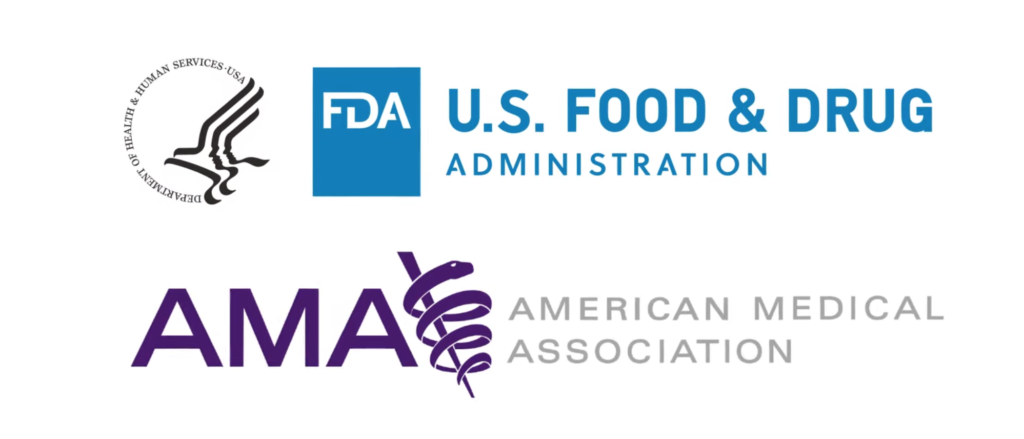
In principle, a well-researched CME course on supplements is a great idea. Over two-thirds of all Americans take supplements. Research on probiotics, vitamin D, omega-3 fatty acids, and a host of phytochemicals has exploded in recent years. Quality assurance within the industry is rapidly improving, with many companies adhering to pharmaceutical standards in their manufacturing facilities.
It is also true that there are problems with supplements—intentional or accidental adulterations, unscrupulous marketing, exaggerated product claims—that warrant greater attention from the clinical community.
There’s never been a stronger need for good practitioner education on the pros and cons of supplements, the laws that regulate them, and their role in clinical practice.
But that’s not what the FDA and AMA have delivered.
Education or Dissuasion?
One minute into the first video, it becomes clear that the intention of this series is not to educate, but to frighten, and to discourage the clinical use of supplements.
“As a physician, you play a leadership role in guiding your patients’ health and well-being. They look to you not only for medical diagnosis and treatment, but also for your knowledge and expertise on a wide range of topics. Dietary supplement use is one of these important topics,” chirps the nameless narrator as she ambles about a lavender-walled medical office stage set.
There’s never been a stronger need for good practitioner education on the pros and cons of supplements. But that’s not what the FDA and AMA have delivered.
“Yes, supplements can have benefits. But they may also come with risks. For example, they can cause adverse reactions or interact with medications and other supplements. And many of your patients probably don’t realize that unlike prescription drugs, dietary supplements are not approved by the government for safety and efficacy.”
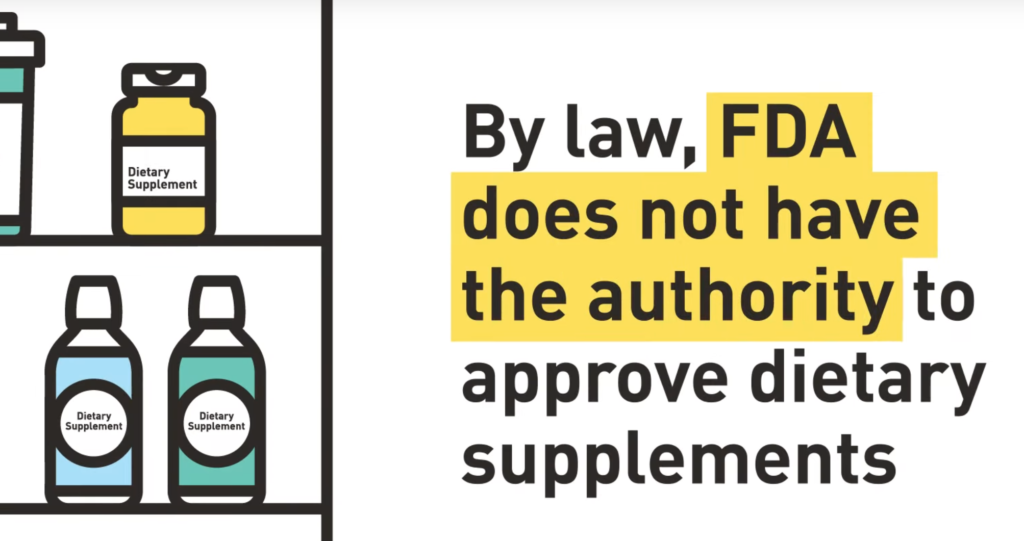
That chorus—“Unlike prescription drugs, dietary supplements are not approved by the FDA”—is sung four times (yes, I counted) within the first 7 minutes of Module 1, and at least as many times in Modules 2 and 3.
The video then gives the basics of the Dietary Supplements Health and Education Act (DSHEA); the legal definition of “dietary supplement” (a category of food, products must be ingested, intended to augment essential nutrients that some people might not get from their diets); the principle of structure/function claims; supplement labeling rules; the requirement for the FDA disclaimer statement; and the mandate that marketers notify FDA within the first 30 days of introducing a new product.
Then comes Module 1’s main message: “Dietary supplements are not intended to treat, diagnose, prevent, mitigate, or cure diseases. Products bearing such claims are classified as DRUGS.” The latter word is spelled out in big, screen-filling letters.
FDA’s intrepid “expert” emphasizes that, “Products bearing such claims are classified as DRUGS, and must meet all requirements that apply to DRUGS.” (Again, big screen-filling letters).

She lets us know that FDA inspects supplement manufacturing plants, and collaborates with the Federal Trade Commission on post-market surveillance, sometimes banning noncompliant, adulterated, unsafe, or misbranded products. But—and there’s always a “but” in these videos—she adds that the ever-expanding number of products on the market “presents a challenge for FDA.”
Another key take-away: Doctors need to know that supplements should never, ever be taken as meal substitutes—as if millions of Americans are foregoing actual food and sitting around the dinner table sharing pills, capsules, and gummies!
This is followed by the age-old canard that, “Conventional food should always be the primary source of nutrients.”
The video zealously repeats this message like the Mister Softee jingle on a hot summer day. But somehow it conveniently ignores the reams of data—some from federal agencies—showing that most Americans do not follow healthy nutritious diets. With grocery prices soaring and gas hovering at $5 per gallon nationwide, it’s likely that more people will be eating more processed crap and less nutrient-dense healthy food. But who needs supplements?!?
Scare Tactics
The second video focuses on “clinical issues.” It’s main message? Talk to your patients about supplements. Warn them that “Unlike prescription drugs, the FDA does not….” (you know the rest). Also let them know that supplements can interfere with drugs and could very possibly throw off their lab test results.
“Combining dietary supplements with certain prescription and OTC medications could have dangerous and even life-threatening consequences,” says our all-knowing presenter, as a big black exclamation point waggles against a bright orange “caution” background.
FDA offers the following examples:
- St. John’s Wort can reduce the efficacy of some medications for heart disease, cancer, HIV, depression, seizures, and birth control.
- Vitamin K, high doses of vitamin E, and Ginkgo biloba can interact with warfarin.
- Vitamin C and vitamin E might reduce the effectiveness of cancer chemotherapy.
Fair enough. Anyone with a bit of experience using supplements knows that some of them can interfere with some pharmaceuticals. But it is equally true that many drugs deplete important nutrients, and also that some supplements may increase the efficacy of certain drugs, creating a dose-sparing effect. These are phenomena that the FDA and AMA do not deem important enough for inclusion in a physician education video.
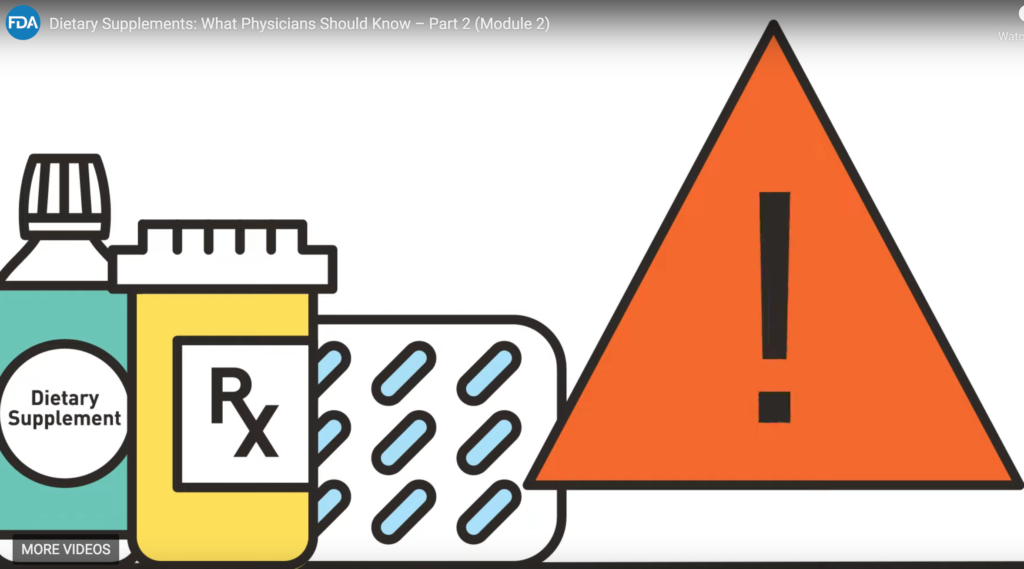
Then comes the lab test warning. The video claims some supplements interfere with diagnostic tests, causing incorrect results and missed diagnoses.
The example cited is biotin—”often found in multivitamins, prenatal vitamins, and dietary supplements marketed for hair skin and nail growth”—the taking of which can cause, “a falsely low result for troponin, a clinically important biomarker that helps with diagnosing heart attacks. An inaccurate result could lead to a missed diagnosis and potentially serious clinical implications.”
FDA issued a warning back in 2019 about the potential for biotin to alter troponin tests, and there is some evidence that this can occur (Researchers at the University of Texas Southwestern Medical Center published a thorough study on this matter). It is a legitimate concern.
But then the FDA’s scriptwriters pull a move of such aerodynamic audacity that they could qualify for the Navy’s Blue Angels squadron:
“While biotin is just one example, it is possible that other dietary supplements could also interfere with diagnostic tests. If a lab test result does not match the clinical presentation of your patient, consider supplement interference as a possible source of error. And communicate with the lab conducting the test if you suspect supplement interference.”
So, basically, any time you see an unexpected lab result, the FDA is suggesting that you suspect the patient’s supplements. As if lab processing errors, mishandling of samples, and interactions between the dozen or so meds a patient is taking, never ever happen. Just go ahead and blame the supps!
This is followed by a warning that some products sold as supplements contain undisclosed drugs. The most common hidden drugs are: sibutramine, sildenafil, tadalafil, phenolphthalein.
On the rare occasions these videos acknowledge some vague potential benefit from supplements, the statement is always followed by a “But….” and a restatement of the FDA’s limited authority, or the axiom that supplements do not replace drugs or foods.
Again, adulteration and mislabeling are legitimate concerns, but that is hardly news to anyone in the medical field. And it is rarely a problem with products from well-established brands that comply with federal good manufacturing practices (GMPs).
A Push for AER
The FDA/AMA course stresses the importance of reporting adverse events.
The narrator urges clinicians to “notify FDA if you suspect that a dietary supplement may have caused an adverse or an unanticipated reaction for your patient.” She explains how to do this via the federal government’s online safety reporting portal (Www.safetyreporting.hhs.gov).
No doubt, some supplement ingredients can be toxic in high doses. Some can trigger adverse reactions, and may interact with prescription meds. It is possible that adverse events have been under-reported for decades. Without a requirement to report, practitioners may not bother to log suspicious incidents with the agency.
But let’s keep in mind that every year, FDA-approved pharmaceuticals cause roughly 1.3 million adverse events serious enough to warrant ER visits. Yet this has never prompted the FDA to issue scare videos to dissuade doctors from prescribing drugs.
To assume supplements are culpable whenever someone ends up in the ER—as is suggested by this video—raises the potential for a swing toward extreme over-reporting.
This CME series is devoid of any practical information on how to use any type of supplement in patient care.
Module 2 peaks with a simulated clinical vignette in which an actor playing a doctor asks her actor-patient if he’s taking supplements. He says he’s taking a multivitamin, occasional melatonin to help with sleep, and calcium, “because dairy doesn’t always agree with me.”
“Doctor”: Did another doctor recommend that you take these?
“Patient”: No.
“Doctor”: Just keep in mind that dietary supplements have both benefits and risks. I sometimes recommend supplements for my patients who are not getting enough essential nutrients from their diets—like the calcium you mentioned.
But she then frets that supplements may contain “unproooooven ingredients or be falsely marketed,” and that “people might use a supplement in place of a prescription drug.” Oh, and by the way, she tells her now-alarmed patient: “Did you know that dietary supplements aren’t approved by FDA?” (Cue the Mister Softee jingle)
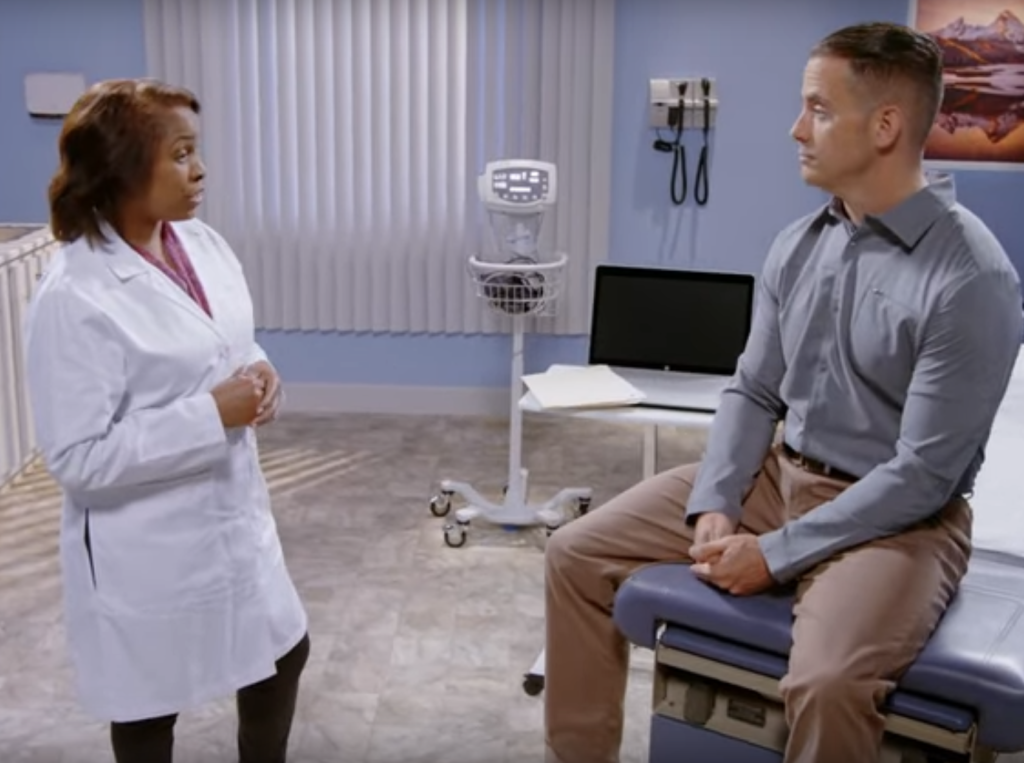
The third video—a hodge-podge of themes from the first two—seems to be written more for a consumer audience than a medical one. That’s odd given that this is a CME program.
“When it comes to taking dietary supplements, it is important to be an informed consumer. And don’t believe everything you read,” our announcer states.
With their aggregate resources and collective brain trusts, the AMA and FDA could have created something truly interesting and impactful on public health. They chose not to do so, opting instead to push out a smear job masquerading as a CME program.
She cautions everyone to be alert for products that claim to be ‘totally safe’ or to have ‘no side effects,” to “always talk to your doctor, pharmacist, or other healthcare professional” when considering supplements, and to immediately report any potential adverse events to the FDA. The series ends with a warning that supplements could be dangerous for pregnant and nursing women, and small children.
And that, dear reader, is the length and breadth of what the federal government’s leading regulatory agency and the country’s oldest and largest physicians’ organization (current membership over 270,000), think you should know about supplements.
In a nutshell, it comes down to this: supplements are not regulated like drugs, they’re potentially dangerous, probably unnecessary, and might even muck up important diagnostic tests.
Absence of Accountability
In 30 minutes, there is not a word about all the new research on probiotics. There’s nothing on omega-3s, vitamin D, antioxidants, botanicals. Not even a mention that probiotics can alleviate the adverse GI effects of antibiotics. No discussion about nutritional support for mitochondrial activity, immune system resilience, epithelial integrity, or autonomic regulation.
On the rare occasions these videos acknowledge some vague potential benefit from supplements, the statement is always followed by a “But….” and a restatement of the FDA’s limited authority, or the axiom that supplements do not replace drugs or foods.
This CME series is devoid of any practical information on how to use any type of supplement in patient care.
And you know what else is missing from this FDA/AMA “education” series? References!
For its bold claims about the dangers of supplements, there’s not a single citation in either the videos or the accompanying PDF downloads. Not one. Nor is there any information about who compiled the content or who wrote the video scripts. How’s that for accountability?
This is ironic, given that: A) CME activities are supposed to be “evidence-based,” B) the AMA’s CME review boards are notorious for their scrutiny of content produced by other groups, and C) FDA officials and supplement detractors whine so often about the absence of data to support supplements.
“Risk-Based Conversations”
In a statement announcing the CME collaboration, the AMA noted that the its work in developing this content, “stems in part from policy adopted by the House of Delegates in 2020 urging physicians to inquire about patients’ use of dietary supplements and engage in risk-based conversations with them about dietary supplement product use.”
“Dietary Supplements: What Physicians Should Know” definitely delivers on the “risk” part. Simply put, this is a scare campaign, not an education program. To call it the latter is a false and misleading claim. I’m tempted to call the FTC.
I suppose I should not be surprised by any of this. The videos are in keeping with the long tradition of excluding meaningful nutrition education in most medical and nursing schools. From its earliest days, the AMA has been hostile toward naturopathy, herbal medicine, nutrition, Asian and Indigenous medical traditions, and basically anything outside the pharmaceutical, surgical, or medical device models of healthcare.
The FDA, for its part, clearly wants greater authority over supplements. Some within the agency and within Congress want to see all but the most basic ones regulated as drugs.
Earlier this year, Sen. Dick Durbin (D-IL) called for mandatory pre-market FDA listings for all dietary supplement products—a benign idea on paper, but one that many within the industry and within holistic medicine view as a prelude to requirements for pre-market FDA approval of supplements.
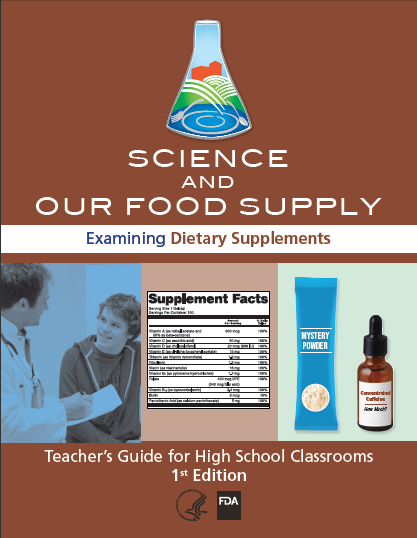
The FDA’s CME videos were released shortly after the Center for Food Safety and Nutrition (CFSAN) issued Science and Our Food Supply: Examining Dietary Supplements–an 86-page guide to dietary supplements for middle- and high school teachers. This, too, has an alarmist tone, and it is intended to help teachers dissuade teens from taking a lot of supplements.
To its credit, though, this teacher’s guide takes a much more balanced approach. Science and Our Food Supply emphasizes the “cons” more than the “pros,” but it does include statements supportive of some supplements. And it provides references from a wide range of sources. On the whole, it is far more “educational” than the CME videos.
One would hope that in the midst of a pandemic that laid bare the limitations of allopathic medicine, and in the glare of countless studies showing that diet and lifestyle factors are the main drivers of chronic disease, the AMA and FDA might’ve shown a little humility and dropped their ossified stances against supplements.
But that’s not the case. If anything, the CME program shows that the negative attitudes are more entrenched than ever.
Credit where credit is due: the “FDAMA” did a commendable job of virtue signaling. The producers cast a young Asian-American woman as narrator, and an African-American woman to play the role of “Doctor” to a Euro-American male “Patient.” That’s progress, I suppose. But it’s the only thing remotely progressive about these videos.
With their aggregate resources and collective brain trusts, the AMA and FDA could have created something truly interesting and impactful on public health. They chose not to do so, opting instead to push out a smear job masquerading as a CME program.
Dietary Supplements: What Physicians Should Know would be laughable if it weren’t so frustrating.
END







